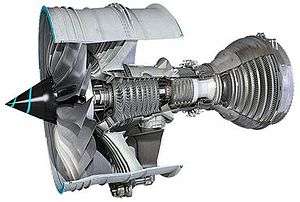Rolls-Royce Trent 7000
| Trent 7000 | |
|---|---|
 | |
| Type | Turbofan |
| National origin | United Kingdom |
| Manufacturer | Rolls-Royce Holdings |
| First run | 27 November 2015[1] |
| Major applications | Airbus A330neo |
| Unit cost | US$37.9M (2014 list price)[2] |
| Developed from | Rolls-Royce Trent 1000 |
The Rolls-Royce Trent 7000 is the seventh iteration of the Trent family of large turbofan jet engine and is the exclusive engine for the Airbus A330neo. The Trent 7000 is based on the Trent 1000-TEN architecture from the Boeing 787 and the technology of the Trent XWB of the Airbus A350 XWB.
Development
It succeeds the Trent 700 used for the Airbus A330, its selection was announced with the A330neo launch in July 2014.[3] It first ran on 27 November 2015 on a test bed in Derby.[1]
Although the first two test engines will be made in Derby, further test engines and production Trent 7000 will be assembled in Rolls-Royce Singapore facility.[4] In 2015 Rolls experienced development problems with the Trent 1000 TEN, and had to involve extra resources to support the on-time March 2017 787-10 maiden flight but it led to delaying the Trent 7000.[5] The first pair of engines were shipped to Airbus in June.[6]
Design
Compared to the 20-year-older Trent 700, which was introduced in 1995, the larger fan, 112 inches (2.8 m) compared to 97 inches (2.5 m), associated with a smaller fan hub doubles the bypass ratio from 5 to 10.[7] It has the highest bypass ratio of any Trent engine.[8]
The overall pressure ratio increases from 36 to 50 thanks to Trent XWB core compressor technology, improving thermal efficiency. It implies 200-kelvin higher internal temperatures, handled by thermally coated high-pressure turbine blades, not needing more expensive ceramic matrix composites, which will be used in 2020 with the next Rolls-Royce engine generation. The larger fan and higher bypass ratio need a low-pressure turbine with two more stages; the engine will be 3,500 pounds (1,600 kg) heavier.[7]
Even with the additional weight and the extra drag from the wider diameter, fuel consumption will improve by 11%. Using bleed air instead of generating electrical power as in the 787's Trent 1000, the less loaded IP accessory drive enables the high-pressure compressor to maintain stability at low power settings, improving low-speed fuel consumption for short-haul operations. The engine will feature state of the art Full Authority Digital Engine Controls (FADEC) and Engine Health Monitoring (EHM) systems, and active turbine clearance control providing the optimal level of cooling air for different phases of flight.[7]
Specifications
Data from "Trent 7000". Rolls-Royce Holdings.
General characteristics
- Type: Three-shaft turbofan jet engine
- Length:
- Diameter: 112 in (284 cm) fan, 20 blades
- Dry weight: 3,500 pounds (1,600 kg) more[7] than the 6,160 kg (13,580 lb) Trent 700[9] (~17,080 lb (7,750 kg))
Components
- Compressor: axial, 8 stages IP, 6 stages HP
- Turbine: axial, 1 stage HP, 1 stage IP, 6 stages LP
Performance
- Maximum thrust: 68,000–72,000 lbf (302–320 kN)
- Overall pressure ratio: 50:1
- Bypass ratio: 10:1
- Fuel consumption: -10% against current today’s Trent 700
- Power-to-weight ratio:
See also
- Related development
- Comparable engines
- Related lists
References
- 1 2 "Rolls-Royce celebrates first run of Trent 7000 demonstrator engine" (Press release). Rolls-Royce Holdings. 27 November 2015.
- ↑ "Rolls-Royce wins Trent 7000 order worth $455M from Hawaiian Airlines" (Press release). Rolls-Royce Holdings. 18 December 2014.
- ↑ "Airbus selects Rolls-Royce Trent 7000 as exclusive engine for the A330neo" (Press release). Rolls-Royce Holdings. 14 July 2014.
- ↑ "Rolls-Royce Developing New Engines in Singapore". Aviation Week. Feb 16, 2016.
- ↑ Guy Norris (Jun 9, 2017). "Rolls Readies For Dual Debuts At Paris But Misses Out On A330neo Airbus A350-1000 and Boeing 787-10 show debuts boost Rolls, but Airbus A330neo delay highlights strategy risks". Aviation Week & Space Technology.
- ↑ Michael Gubisch. "Rolls-Royce sends first Trent 7000 pair to Airbus 16 June 2017". Flightglobal.
- 1 2 3 4 "The All-New Rolls-Royce Trent 7000". airinsight. July 23, 2014.
- ↑ "Trent 7000". Rolls-Royce.
- ↑ "Type-Certificate Data Sheet RB211 Trent 700 series engines" (PDF). EASA. 14 October 2014.